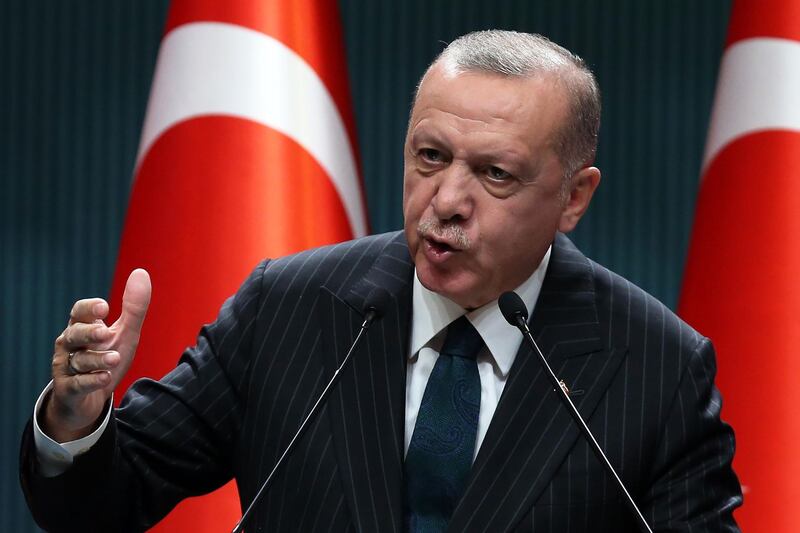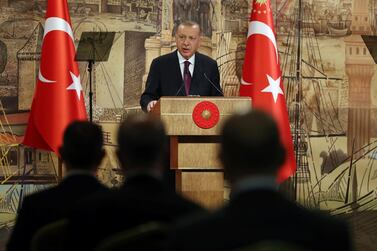President Recep Tayyip Erdogan has said Turkey’s navy will not back down as Greece stands its ground in the eastern Mediterranean Sea.
“The ones who throw Greece in front of the Turkish navy will not stand behind them,” Mr Erdogan said after a Cabinet meeting on Monday.
But Athens said it was prepared to do all necessary to defend its sovereignty in the waters amid its islands.
“Greece is responding calmly and with readiness both on a diplomatic and on an operational level," Greek government spokesman Stelios Petsas said.
"And with national confidence it does everything needed to defend its sovereign rights."
Mr Erdogan claimed Athens did not have the right to broadcast maritime navigational and weather advisories, known as Navtex, in areas claimed by Ankara.
“Greece has declared its own Navtex unlawfully and in a spoiled manner," he said.
"With this approach, Greece has sown a chaos that it will not be able to escape from."
Turkey has extended the exploration mission of its Oruc Reis survey ship in the disputed part of the eastern Mediterranean to August 27, stoking tension in the region.
The vessel has been carrying out seismic surveys, which Athens said were illegal, for natural gas in water claimed by Cyprus and Greece.
Hours before Mr Erdogan made his comments, Mr Petsas said Athens had issued a Navtex advisory also expiring on August 27.
The advisory would see its air and naval forces conduct joint exercises in the area that overlaps with the one claimed by Ankara.
Turkey and Greece, Nato allies, vehemently disagree over claims to hydrocarbon resources in the area.
Ankara claims the water, dotted with mostly Greek islands, is part of its continental shelf.
Turkey’s Defence Ministry said maritime training involving Turkish and allied navy ships would be conducted in the eastern Mediterranean on August 25.
Turkey and Greece also disagree on flights over the Aegean Sea and the status of Cyprus, which is divided between the Greek Cypriot-controlled south and the breakaway Turkish Republic of Northern Cyprus.
That republic is not recognised by much of the world community.
Greece had already sent a large part of its navy in response to the drilling exploration by fellow Nato member Turkey. The EU and the US have backed Greece in the dispute.
German Foreign Minister Heiko Maas is due in Athens and Ankara on Tuesday to try and revive talks between senior Greek and Turkish officials, in an initiative that started in July but was broken off by Turkey weeks later.
On Friday, Mr Erdogan announced that Turkey had discovered a large natural gas reserve of 320 billion cubic metres, making the find the biggest in the country’s history.








